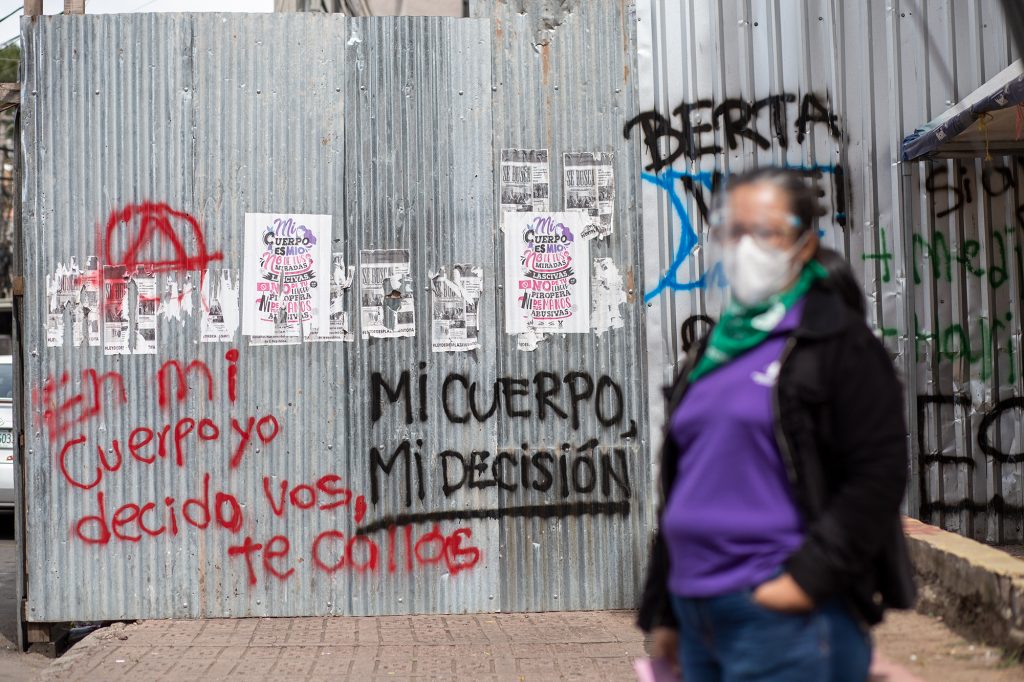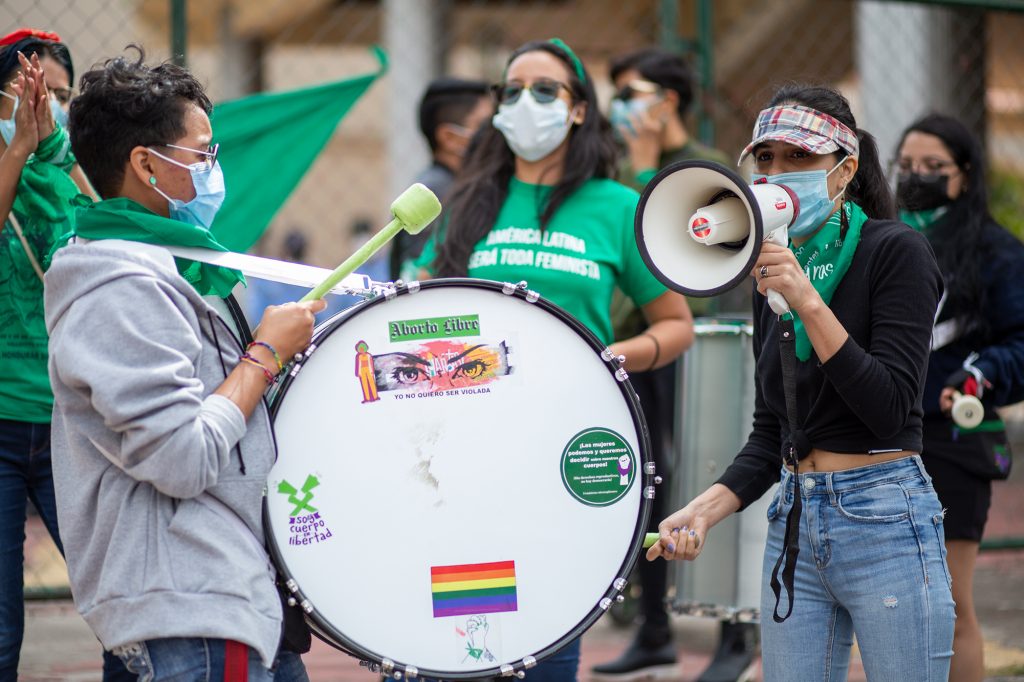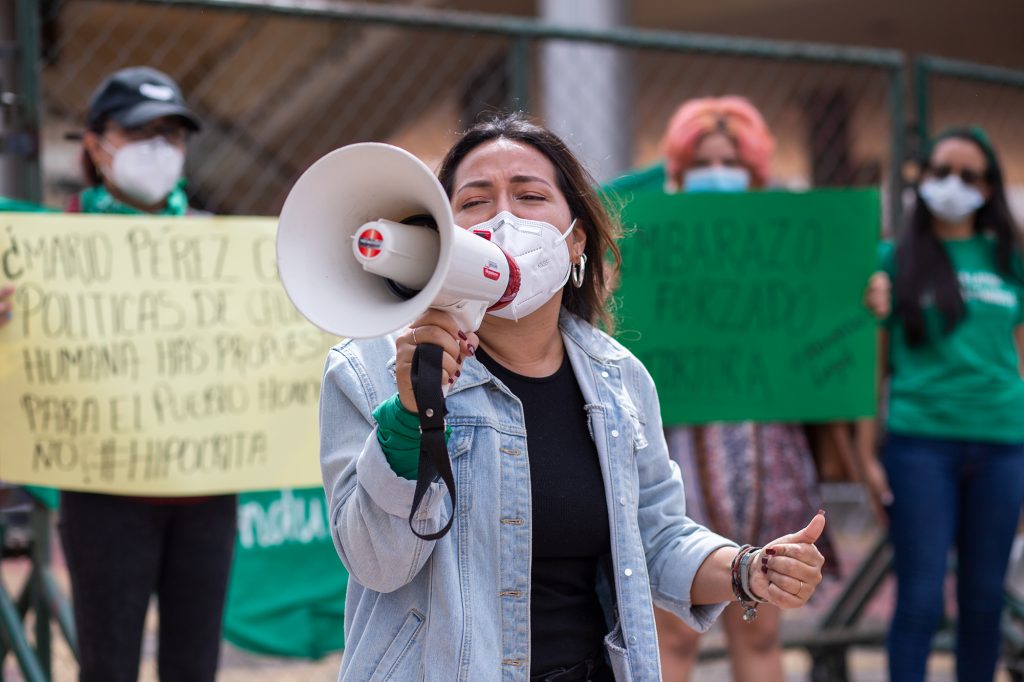Two weeks after abortion was decriminalized in Argentina, Honduran Congressperson Mario Perez introduced a bill in the National Congress that seeks to prevent the legalization of abortion for any reason, even if the constitution is changed.
By: Vienna Herrera
Photos by: Martín Cálix
Honduran congressional representatives usually struggle to find common ground, except when it comes to the issue of abortion. During the 2017 debate on the new Penal Code, only seven representatives voted to eliminate the ban on abortions when performed for three specific reasons. Women’s organizations advocated for the decriminalization of abortion, while conservative groups demanded a ratification of the ban.
The issue of abortion wasn’t raised again in the National Congress until National Party congressperson Mario Perez introduced a bill on January 11 to amend the Honduran constitution. Perez proposed amending Article 67, which prohibits abortion, by adding the following language: “It [Article 67] can only be changed by a vote of three quarters of the National Congress, and its provisions shall remain effective even if it is repealed or amended by another constitutional provision. In the event that a new constitution is approved, its [Article 67] provisions shall be incorporated therein, unless otherwise established by a unanimous vote of the Constituent Assembly.”
Honduras is one of five Latin American countries that maintains a total ban on abortion for any reason. Pérez said in a televised statement that the purpose of the bill is to bullet-proof the country’s ban. “We are concerned about attempts to emulate Argentina’s legalization of abortion, so a group of congressional representatives agreed to propose a bill that will conclusively prevent any such legalization, since abortion is a crime,” said Pérez.
Article 196 of the Honduran Penal Code, which became effective in June 2020, presscribes jail sentences of three to six years if a woman has consented to or caused any abortion; six to eight years for a person who performs or causes an abortion without the consent of the pregnant woman, but without using violence or intimidation; and eight to ten years for a person who uses violence, intimidation, or deception in the course of performing or causing an abortion. Article 196 also stipulates that health care professionals who participate in an abortion will be “…subject to fines of 500 to 1,000 days” worth of income.
“If we apply estimates from other countries indicating that only one of six women have their abortions in hospitals to Honduras, then between 50,749 and 82,135 abortions are occurring here every year,” states a report from the Center for Women’s Rights (Centro de Derechos de la Mujer).
According to data provided by the Ministry of Public Health to Al Jazeera, one in 23 maternal deaths in Honduras was the result of an abortion.
After learning of the newly proposed bill, the Somos Muchas (We are Many) movement staged a sit-in at the National Congress building. Neesa Medina, a Somos Muchas member, said, “This proposed bill doesn’t solve any of the problems that Honduran women and girls face today. It appears to be motivated by a contempt for girls and women, and totally lacks any genuine concern for their dignity and health.”
During the sit-in, Somos Muchas demanded more protection of women’s rights and called for the passage of pending legislation on women’s shelters, domestic workers, and the renewed legalization of emergency contraceptive pills (ECPs).
ECPs have been banned for 11 years, and the Ministry of Public Health has not approved a health care protocol for survivors of sexual violence because it allows the use of emergency contraception. Although the country doesn’t have precise rape-related data, records maintained by the Forensic Medicine government agency indicate that rape cases have more than doubled in the last 10 years.
There were 1,241 rape cases in 2008; in 2018 there were 2,972 cases.
See our 2018 report Raped in an absent state
Rafael Contreras works with Doctors Without Borders in Honduras, an organization that treats survivors of sexual violence. Contreras told Contracorriente that doctors are very limited in how they can treat vicitims of sexual violence because they are not allowed to prevent unwanted pregnancies.
Nessa Medina says, “There’s no justification for so much delay in passing laws that should be almost instinctive. Why maintain a ban on ECPs in a country with so many rape victims? What could the government’s interest in this possibly be? To force women to have unwanted babies?”
The El Heraldo newspaper obtained data from the Ministry of Public Health indicating that between January 2017 and November 2019, 33,378 girls aged 14-17 gave birth, while 647 girls aged 9-13 gave birth.
The World Health Organization says that minors face higher risks during pregnancy, and childbirth is the leading cause of death for 15–19-year-old girls globally.
“It’s frightening and painful to live in a country led by people who don’t care about us at all. Girls and women in Honduras know that the government has great disdain for us,” said Medina.
Mauricio Oliva, a National Party presidential hopeful, posted a statement on Twitter that he could be flexible about several aspects of the new Penal Code, but not about abortion. “I’ll never be in favor of abortion in Honduras,” he shouted in a video posted to several social networks. Another one of his tweets said, “I’m a surgeon, trained to preserve life. I’ll never vote in the National Congress to allow abortion – I’ll always vote for life.”
Another Somos Muchas member feels that the pro-life claims of the bill’s proponents are absurd. Regina Fonseca says, “If this man and our congressional representatives were at all concerned about life, they would have denounced Invest-h, the Ministry of Public Health, all the people who have used the pandemic as an excuse to plunder public funds, as well as the acts of corruption during the Eta and Iota disaster relief effort. Aren’t the lives lost due to resource mismanagement and corruption also important? Do they care about the lives of those who flee this country in caravans?”
Fonseca says that if the National Congress passes this bill, it would be an usurpation of constituent power. “They would be violating the rule of law and taking on functions that do not correspond to Congress. They’re more worried about attacking external agendas because of what happened in Argentina, just like other highly visible groups in Latin America that oppose human rights,” she said.
The influence of faith-based groups in the country’s political decisions is not new. In 2019, Contracorriente participated in the Transnationals of Faith investigation of multinational religious organizations along with 16 other Latin American media outlets. Led by Columbia Journalism Investigations and the Latin American Center for Investigative Journalism (CLIP, for its acronym in Spanish), this collaboration won the Ortega y Gasset Award for best investigative journalism, and revealed how Capitol Ministries, an organization sponsored by members of the Trump administration, attempts to influence political leaders around the world by proselytizing their conservative views regarding LGBTQIA+ rights, the sexual and reproductive rights of women, and the rights of migrants. In Honduras, the National Congress has welcomed this organization with open arms.
In Contracorriente’s report for the Transnationals of Faith series, Pastor Alberto Solórzano of the Christian International Center in Honduras and a member of a number of government commissions, said that they have a deliberate strategy of working closely with the government so that politicians don’t make decisions that violate their own principles. “The church goes to those spaces because that’s where decisions are made that will affect us all as citizens,” he said.
Meanwhile, organizations such as the United Nations and the Inter-American Commission on Human Rights have expressed their concern about the abortion ban. “The total criminalization of abortion runs contrary to the state’s international obligations to respect, protect, and guarantee women’s rights to life, health, and integrity,” states the press release issued by the Organization of American States (OAS).
The United Nations Human Rights Committee has recommended that, “The state [of Honduras] should urgently amend its legislation to help women avoid unwanted pregnancies and ensure that they do not have to resort to clandestine abortions that could endanger their lives and health. In this regard, the State should ensure access to safe and legal abortion when the life or health of the woman is threatened, and in cases of rape, incest, or an unviable fetus due to abnormality. It should also consider decriminalizing abortion…”
Women’s organizations have repeatedly condemned bans on abortion becasue they jeopardize women who suffer miscarriages and contribute to re-victimization.
A case that demonstrated the consequences of abortion bans was described in the Women’s Forum for Life’s (Foro de Mujeres por la Vida) bulletin on Sexual Violence and Abortion During Quarantine (Violencia sexual y aborto en cuarentena), published in 2020. During the quarantine, Jennifer, who was five months pregnant, began to have such severe pain that she went to a private clinic for medical attention. The clinic’s negligence resulted in Jennifer giving birth to a son who only lived for 30 minutes. The clinic charged her 18,000 lempiras for their services, which did not include the curettage procedure (clearing of the uterine lining after a miscarriage or abortion). She was then transferred to the Honduran Institute of Social Security Hospital.
When Jennifer woke up in the hospital, she saw police officers stationed in the maternity ward who later made her sign some papers. She was arrested the next day and taken to Police Station #1 in San Pedro Sula for a hearing. The court ultimately only imposed some alternative punitive measures thanks to the efforts of a private attorney hired by Jennifer.
The Women’s Forum for Life’s bulletin states, “It’s clear from the punitive measures imposed by government institutions that when women are the victims, the wheels of justice grind to a halt during the quarantine, but when women are the perpetrators, the wheels of justice turn quickly.”
After the protest ended, Neesa sat down and declared that they won’t stop protesting. “We don’t have selfish motives for these protests. We all have other women in our lives that we care about and love. We know they’ll be affected [by this new bill]. We are defending the right to make our own decisions, which is truly a selfless act, an act of love. It’s a shame that we have to scratch and claw to defend what little we have, when our government is stealing all of the Honduran people’s money, dignity, and initiative,” said Medina.








